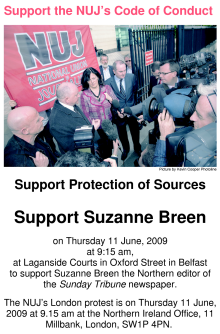|
18 Jun 2009 Suzanne wins!At Belfast Recorders Court today, Judge Thomas Burgess refused an application which would have forced the Northern Editor of the Sunday Tribune to hand over notes, computer equipment and other material following publication of stories relating to the Real IRA. |
||
 Landmark victory for press freedom (NUJ)
Landmark victory for press freedom (NUJ)
|
||
 Reporter wins Real IRA notes case (BBC)
Reporter wins Real IRA notes case (BBC)
|
||
 In defence of the bedrock of society in court (Sunday Tribune)
In defence of the bedrock of society in court (Sunday Tribune)
|
||
|
08 Jun 2009 Rally to support Suzanne Breen! 11/06/09
If you have not already signed the petition in support of the principle of protecting sources please email protectsources@nuj.ie |
||
 Video of the Belfast rally
Video of the Belfast rally
|
||
 John Pilger speaks in support in Belfast
John Pilger speaks in support in Belfast
|
||
 In praise of... Suzanne Breen - Guardian leader
In praise of... Suzanne Breen - Guardian leader
|
||
 Arts world unites behind Suzanne Breen - Sunday Tribune
Arts world unites behind Suzanne Breen - Sunday Tribune
|
||
 We're Backing Suzanne - Sunday Tribune
We're Backing Suzanne - Sunday Tribune
|
||
| Online only | ||
Suzanne Breen protects her sourcesTHE SUZANNE Breen protection of sources case shows that police have become so “lazy” in their investigation of terrorism that they prefer to parasite information by harassing journalists than do the leg work themselves. So said lawyer Mark Stephens at a rally for Breen at the NUJ’s London offices on 26 May. “No longer are the police a lean, mean machine out on the streets seeking evidence,” he said. “Instead they are chasing journalists because it’s quite clear journalists are better at the job than they are.” Breen, northern editor of Dublin’s Sunday Tribune, explained the events leading to her facing a jail sentence of up to five years if she refuses to reveal her sources on a story about the Real IRA. It began on 8 March with a call on her mobile phone when she was about to go into Sainsbury’s. The caller said he was from the Real IRA, gave her the recognised codewords and claimed the Real IRA’s South Antrim Brigade had killed British soldiers and shot two pizza men at Massareene the previous evening. She immediately contacted several media outlets wth this story. Later, she interviewed a representative of the Real IRA Army Council for the Sunday Tribune (12 April). This person gave her details of the 8 March attack which contradicted the official account, including the assertion that the gunmen had got inside the barracks grounds - and added that the Real IRA had shot and killed British spy and Sinn Fein chief administrator Denis Donaldson. This source also announced that the Real IRA would be staging an event in a cemetery where they would declare their intention to kill more soldiers and police officers. Breen told the NUJ meeting that the police reaction was to ignore the Real IRA gathering - the death threats were delivered in public and undisturbed - and then ‘come after the messenger’. They demanded she hand over all telephone, computer and written records of her contacts with the Real IRA. This would mean revealing her sources. She refused. She told the London meeting she’ll continue to refuse: “I won’t be complying on two grounds. The first is selfish. My life would be in danger from the Real IRA. I would have a sledgehammer through the door. The alternative is to be hidden in a witness protection scheme. The second reason is that people who speak to journalists confidentially deserve protection. If I breach their confidence just once no one would trust me again - including the officers who talk to me on the quiet.” The Police Service Of Northern Ireland took Breen to court in Belfast on 8 May seeking an order for her to hand over all records relating to the story. After a hearing from which the press, the public and even Breen and her lawyers were excluded, the judge deferred his ruling. According to Associated Press, his view was that his decision “would depend on weighing competing rights: the police right to information that could help bring killers to justice versus Breen’s right to life”. Facing six months to five years if she refuses an order to reveal her sources. Breen said “I think what’s happened to me is a political decision, not a security decision.” It’ difficult for her lawyers to respond to the police’s specific arguments, given the “Kafkaesque” decision to prevent them from hearing what these were. She compared her case to Sunday Tribune journalist Ed Moloney, who won a similar court battle with police over a story about the Provisional IRA in the 1990s. Then as now the Sunday Tribune backed their journalist, but the recession means Breen’s defence would probably need outside funding if she lost at the initial hearing (Moloney’s case cost over £250,000). At the London meeting, it was agreed that there might well soon be a need for fund-raising and for engaging wide, international support in the legal process. Breen said the NUJ‘s support petition had been of great value and asked people to sign it at and forward the link to friends and colleagues. |
||
 NUJ statement on the case
NUJ statement on the case
|
![[Go to NUJ.LFB home] [NUJ.LFB home]](../gif/nujsma.gif) ![[about CRA]](../gif/ccc1.gif)
|
The Freelance editor is elected by London Freelance Branch and responsibility for content lies solely with the editor of the time
Send comments to the editor: editor@londonfreelance.org
![[Newsletter of London Freelance Branch NUJ] [The Freelance: contents]](../gif/fl1.gif)
![[Newsletter of London Freelance Branch NUJ] [Freelance]](../gif/n1off.gif)
